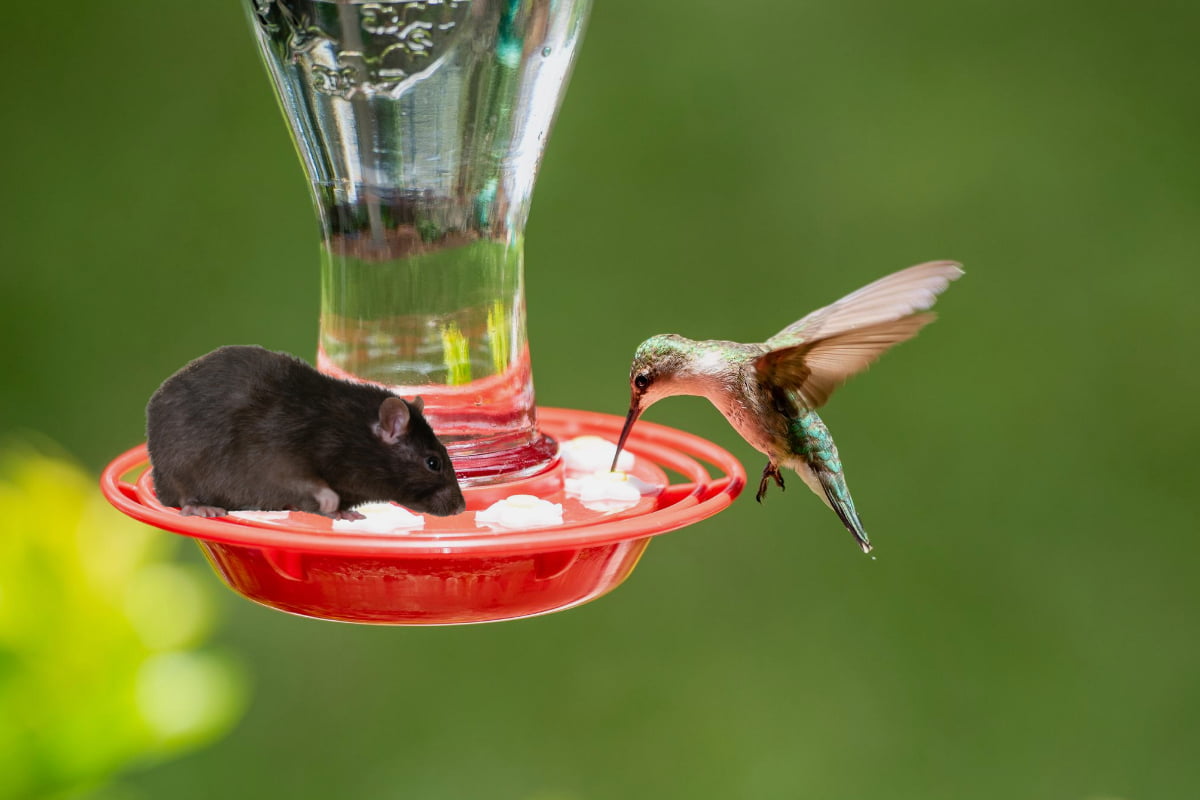One of the most common concerns among homeowners is whether hummingbird feeders attract rats. While hummingbird feeders are popular among bird enthusiasts, some homeowners worry that the nectar used in these feeders may also attract rats.
A recent study has found that hummingbird feeders do not contribute to an increase in rat populations in urban environments. The study suggests that other factors, such as food availability and competition from other animals, are more likely to drive rat populations up.
It is important to note that while hummingbird feeders do not attract rats, they may attract other animals such as bees, wasps, and ants if there is sugar water or nectar in them. Additionally, if the feeder is dirty, it may attract rats.
From personal experience, I have never seen a rat at my hummingbird feeder. However, it is still something to be aware of as it is a possibility.
What Is Hummingbird?
Hummingbirds are small, colorful birds that primarily feed on nectar from flowers. They are found in the Americas and are the only birds capable of flying backwards. They are also known for their incredible speed.
Hummingbirds are primarily attracted to feeders that contain sugar water or nectar. They are also attracted to flowers that produce nectar.
What Does Hummingbird Eat?
Hummingbirds primarily consume nectar from flowers and drink sugar water from feeders. They also feed on small insects that they catch while flying.
Some people worry that hummingbirds may attract rats to the feeders since both animals feed on similar things. However, hummingbirds are careful not to consume the insects they catch in mid-air, and they usually only feed from specific feeders. While it is possible for a few rats to occasionally visit a hummingbird feeder, it is unlikely to be a significant problem.
Rat Facts
Rats are opportunistic feeders, meaning they will consume almost anything. This adaptability allows them to thrive in various environments.
Rats are attracted to easily accessible and abundant food sources. This includes bird feeders, garbage cans, and even pet food bowls. In fact, a study found that rats spend up to 50% of their time feeding on food sources outside of their natural habitats.
Feeding habits can be a concern for homeowners, especially when it comes to bird feeders. Rats can easily climb up feeders to access the food. To prevent rats from feeding on bird feeders, it is important to keep them clean, cover them when not in use, and clean them regularly.
Rat Habitats
Rats are commonly found in dirty and unsanitary areas. They are attracted to places with food and water, including areas where birds are feeding. Rats will seek out these areas to scavenge for food and water. The presence of a feeder can potentially increase the number of rats in an area as they see it as a potential food source.
Rat Solutions
While there is no guarantee to completely prevent rats from coming to hummingbird feeders, there are a few things you can do to minimize their presence:
- Use a rat-proof hummingbird feeder.
- Keep your home clean and free of clutter or anything that could attract rats.
Can Rats Climb Up A Bird Feeder?
Yes, rats can climb up bird feeders. However, there are special bird feeders designed to be rat-proof. If you have a regular bird feeder, rats can climb up it. To prevent rats from climbing up your bird feeder, you can try placing it on a pole or in a location that rats cannot easily access.
Conclusion
It is important to remember that rats are opportunistic creatures and will visit any area where there is food. Taking preventive measures such as creating barriers around feeders, maintaining a clean home, and using rat-proof hummingbird feeders can help minimize their presence.
FAQ’s
Q: What kind of damage can rats do to a bird feeder?
A: Rats can cause significant damage to bird feeders. They can chew through the feeder, leading to breakage. Additionally, they can contaminate the food inside the feeder, posing a risk to birds’ health.
Q: How can I prevent rats from climbing my bird feeder?
A: To prevent rats from climbing your bird feeder, ensure it is made of a material that rats cannot chew through, such as metal. You can also place a barrier, such as a wire fence, around the feeder to make it more difficult for rats to climb.
Q: Do rats only climb bird feeders?
A: No, rats can climb anything they can grip onto, including trees, houses, and power lines.
Q: How high can rats climb?
A: Rats can climb up to approximately 3 feet high.
Q: Are rats dangerous?
A: Yes, rats can be dangerous as they can carry diseases that are harmful to humans and animals. They can also cause property damage.
Q: What Do Rats Eat?
A: Rats are omnivorous animals and will eat a wide range of food. In the wild, their diet consists of fruits, vegetables, nuts, seeds, and insects. However, when living near humans, rats will also consume garbage, pet food, and bird seed.
